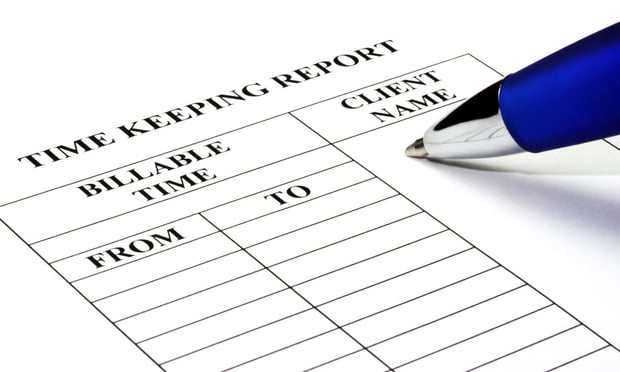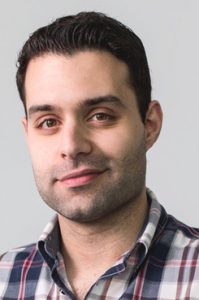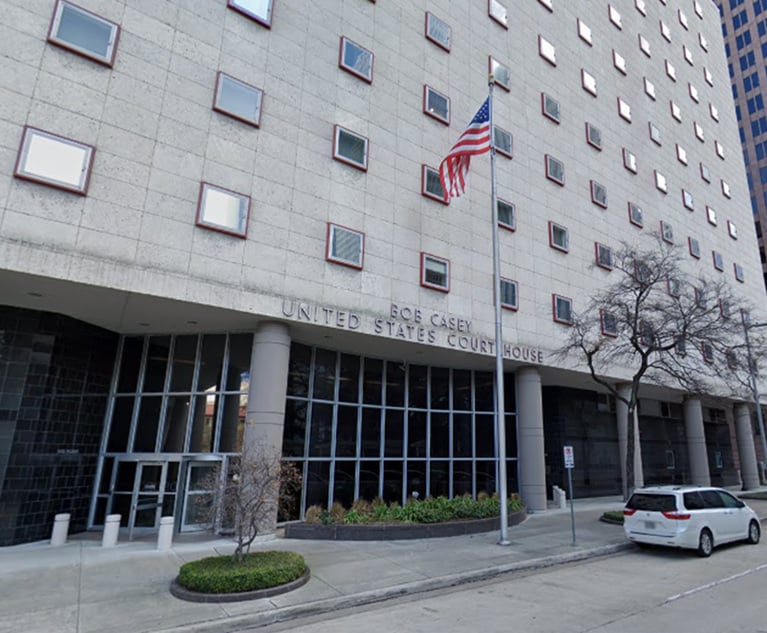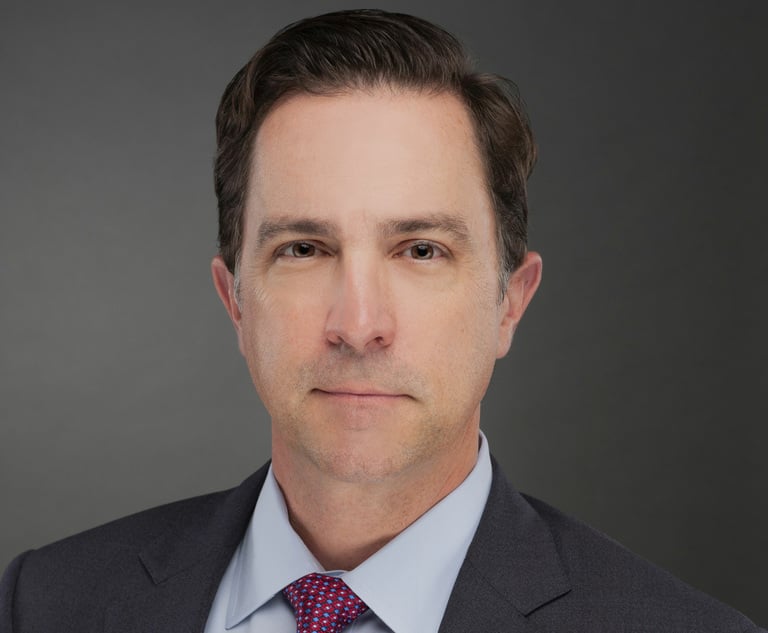US Lawyers Spend Only 30 Percent of Workday on Billable Hours, Report Says
So what are they doing the rest of the day?
October 05, 2018 at 12:30 PM
4 minute read

U.S. lawyers are still spending too little of their workday on billable hours, a year after an eye-opening report found lawyers devoted only 29 percent — 2.3 hours — of each eight-hour workday to billable hours.
This year's Legal Trends Report, prepared by Clio, a Canadian company that provides cloud-based practice management for firms, found that the average utilization rate improved only incrementally to 30 percent, which is 2.4 hours of billable hours each workday.
Additionally, the third annual Legal Trends Report, made public on Thursday, finds that lawyers invoice clients for only 1.9 hours accomplished during an eight-hour workday and collect only 1.6 hours of that time.
That's a lot of time not spent on billable hours.
Instead of completing billable hours during the workday, the lawyers spend their time on billing and financials; marketing and business development; and firm organization and administration.
“The fact that lawyers miss out on nearly 5.6 hours of billable work each day should be a wake-up call for why efficiency is so important to law firms — it's a critical leverage point for increasing revenues,” Clio wrote in the report.
 George Psiharis
George PsiharisA large majority, 84 percent, of legal professionals surveyed for the report said they equate success with increasing firm revenue. But George Psiharis, chief operating officer for Clio, said it is surprising that few of the lawyers and other legal professionals consider factors that can increase revenue — growing a client base and billing more hours — as important factors in a firm's success. Only 34 percent of the legal professionals said growing the firm's client base is a key route to success, and only 23 percent said that billing more hours would make their firm more successful.
In contrast, 80 percent of lawyers said improving efficiency of firm operations is an important factor, and 77 percent said hiring more staff would also help the firm be successful.
“That was a big surprise for us. The top two things you think about doing for driving more revenue were at the bottom of the list,” Psiharis said.
However, increasing revenue by producing more billable hours, according to the report, is not as simple as working more than eight hours a day. Clio reports that the average full-time lawyer plans to work 46.8 hours a week, but actually works 49.6 hours a week. That adds up to an extra 3.5 weeks of unplanned work each year.
Three-quarters of lawyers report that they work outside of regular business hours, and 39 percent said that negatively affects their personal life.
The report is based on data collected from nearly 70,000 legal professionals that are Clio clients, a survey of 1,968 legal professionals, including Clio users and non-users, and a survey of 1,336 consumers. Psiharis said most of the company's clients work at firms ranging from solos to middle-market firms of about 200 lawyers.
The report also found that billing rates at U.S. firms hit an average of $245 an hour as of February 2018, a level that keeps pace with the rise in the cost of living from 2010 through February. Billing rates for nonlawyers, however, have changed little since 2011.
Some practice areas are more profitable than others, because of higher realization and collection rates. For instance, intellectual property lawyers charge an average of $327 an hour and collect $258, while lawyers who represent juvenile court clients bill an average of $87 an hour and only collect $60.
The report shows these average billing rates for lawyers in 10 large metropolitan markets: $368/hour in New York; $346 in Los Angeles; $327 in Washington, D.C.; $312 in Chicago; $305 in Atlanta; $302 in Dallas; $297 in Miami; $288 in Boston; $287 in Houston; and $269 in Philadelphia.
RELATED STORIES:
What Do Lawyers Really Do With Their Time?
Lawyers Maintain an Edge in Rising Billing Rates, Study Finds
This content has been archived. It is available through our partners, LexisNexis® and Bloomberg Law.
To view this content, please continue to their sites.
Not a Lexis Subscriber?
Subscribe Now
Not a Bloomberg Law Subscriber?
Subscribe Now
NOT FOR REPRINT
© 2025 ALM Global, LLC, All Rights Reserved. Request academic re-use from www.copyright.com. All other uses, submit a request to [email protected]. For more information visit Asset & Logo Licensing.
You Might Like
View All
JCPenney Seeks Return of More Than $1.1M From Jackson Walker For Bankruptcy Work
3 minute read
Ex-Appellate Court Judges Launch Boutique Focused on Plaintiffs Appeals
2 minute read
O'Melveny, White & Case, Skadden Beef Up in Texas With Energy, Real Estate Lateral Partner Hires
5 minute read
Chamberlain Hrdlicka Taps a New Leader as Firm Follows Succession Planning Path
3 minute readTrending Stories
- 1Newsmakers: Littler Elevates Dallas Attorney to Shareholder
- 2South Florida Real Estate Lawyers See More Deals Flow, But Concerns Linger
- 3General Counsel Accused of Destroying Evidence
- 42,000 Docket Entries: Complex South Florida Dispute Sets Precedent
- 5Incoming Howard University Law Professor Kiah Duggins Among DC Plane Crash Victims
Who Got The Work
J. Brugh Lower of Gibbons has entered an appearance for industrial equipment supplier Devco Corporation in a pending trademark infringement lawsuit. The suit, accusing the defendant of selling knock-off Graco products, was filed Dec. 18 in New Jersey District Court by Rivkin Radler on behalf of Graco Inc. and Graco Minnesota. The case, assigned to U.S. District Judge Zahid N. Quraishi, is 3:24-cv-11294, Graco Inc. et al v. Devco Corporation.
Who Got The Work
Rebecca Maller-Stein and Kent A. Yalowitz of Arnold & Porter Kaye Scholer have entered their appearances for Hanaco Venture Capital and its executives, Lior Prosor and David Frankel, in a pending securities lawsuit. The action, filed on Dec. 24 in New York Southern District Court by Zell, Aron & Co. on behalf of Goldeneye Advisors, accuses the defendants of negligently and fraudulently managing the plaintiff's $1 million investment. The case, assigned to U.S. District Judge Vernon S. Broderick, is 1:24-cv-09918, Goldeneye Advisors, LLC v. Hanaco Venture Capital, Ltd. et al.
Who Got The Work
Attorneys from A&O Shearman has stepped in as defense counsel for Toronto-Dominion Bank and other defendants in a pending securities class action. The suit, filed Dec. 11 in New York Southern District Court by Bleichmar Fonti & Auld, accuses the defendants of concealing the bank's 'pervasive' deficiencies in regards to its compliance with the Bank Secrecy Act and the quality of its anti-money laundering controls. The case, assigned to U.S. District Judge Arun Subramanian, is 1:24-cv-09445, Gonzalez v. The Toronto-Dominion Bank et al.
Who Got The Work
Crown Castle International, a Pennsylvania company providing shared communications infrastructure, has turned to Luke D. Wolf of Gordon Rees Scully Mansukhani to fend off a pending breach-of-contract lawsuit. The court action, filed Nov. 25 in Michigan Eastern District Court by Hooper Hathaway PC on behalf of The Town Residences LLC, accuses Crown Castle of failing to transfer approximately $30,000 in utility payments from T-Mobile in breach of a roof-top lease and assignment agreement. The case, assigned to U.S. District Judge Susan K. Declercq, is 2:24-cv-13131, The Town Residences LLC v. T-Mobile US, Inc. et al.
Who Got The Work
Wilfred P. Coronato and Daniel M. Schwartz of McCarter & English have stepped in as defense counsel to Electrolux Home Products Inc. in a pending product liability lawsuit. The court action, filed Nov. 26 in New York Eastern District Court by Poulos Lopiccolo PC and Nagel Rice LLP on behalf of David Stern, alleges that the defendant's refrigerators’ drawers and shelving repeatedly break and fall apart within months after purchase. The case, assigned to U.S. District Judge Joan M. Azrack, is 2:24-cv-08204, Stern v. Electrolux Home Products, Inc.
Featured Firms
Law Offices of Gary Martin Hays & Associates, P.C.
(470) 294-1674
Law Offices of Mark E. Salomone
(857) 444-6468
Smith & Hassler
(713) 739-1250






